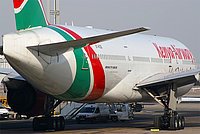and other Bank Twits
Twitter is a micro-blogging tool that is really nifty for doing mini-posts, forwards and other remarks that (are on any subject) and are maybe not worthy of a full blog post. Here’s a summary of my week on Twitter where there was some interesting discussions, but so far yet to unravel mysteries at Kenya airways, Safaricom and Athi river mining? and some replies
June 15: nairobbery Reading about a Nairobi scam where people actually throw themselves on the windscreens of slow moving cars and later ask for compensation
Kenya central bank study shows popularity of MPesa; users rate it cheap, fast, reliable & accessible http://tinyurl.com/nozxe3
June 16: Media mystery: what happened to the Bamburi vs. Athi story? there were many reporters there but was story buried? http://tinyurl.com/n2k5o8 replies @nakeel It’s called the power of advertising and who pays your bills..
June 17: Economist says Africa’s next country South Sudan “will fail before it has even been born” http://tinyurl.com/kwlw9w
DT Dobie advertising that a Mercedes E200 kompressor is 1796cc and therefore compliant with new Kenya Government rules for Ministers cars
Anti-corruption initiatives falter around Africa http://www.nytimes.com/
Racial Discrimination at World Bank?http://bit.ly/fNXUy
CNBC TV show President Obama killed a fly during an interview. Take it away FOX
Is the Kenya rugby safari sevens tourney over-priced at 1,500 ($19) per season ticket? http://tinyurl.com/m9yhmb
Two new independent (non stockbroker) directors at Nairobi Stock Exchange – NSE Board http://tinyurl.com/n8qqvx
June18 KPLC is going to increase the birth rate in kenya if they keep failing to supply electricity.
June 19: Kenya and Uganda Catholic churches in a race to hell with simultaneous abuse scandals; media coverage in UG is NSFW http://www.redpepper.ug
Michela Wrong to visit the World Bank http://bit.ly/LpJHy
June 20 Discovering the mysterys of white cap, EABLs no.2 that survives recessions without any advertising
replies @coldtusker I didn’t say it ‘failed’ but IMHO its core consumer base isn’t GenX but my mzee’s generation. What happened to WC lite? White Cap’s demographics are skewed to stable, older, wealthier, ‘old dogs’ market. It has failed among the ‘younger’ drinkers. @Fintradecapital thats really true. Its drinkers r consistent.
I use nivea creams, but all their posters and adverts scream i am soooò not their target customer!
replies @uhusiano is cos they are all jungus? @coldtusker Are you thinking of doing a chaz bono? re: nivea – not their target market… LOL… @devonwhittle I’m also a Nivea customer, but their “skin whitening” products and ads worry me – @karuoro I use Nivea shower gel but prefer Vaseline lotion..find nivea lotions too..sticky (don’t know if that makes sense) @Ethnicsupplies I’ve never liked the smell @Shiko_Msa we the target customers that is. feel welcome. Even though they dont welcome we do.
Stomping through kilelewshwa – many apartment complexes have ‘to let’ signs
june 21 Safaricom selling cheap internet ready phones including nokia 1680 for $38 replies @alykhansatchu I was reading that @ thinking 13m Subs converts to 2m x $1.00 a day internet
@coldtusker also former Kenya Airways director is CEO air uganda. Seems KQ is now finishing school for sub-saharan airline bosses. replies @coldtusker Hugh Fraser (ex-KQ now CEO of Air Uganda) was in the very important Commercial Director post @ coldtusker Neil Canty (former CFO-KQ) went to Gulf Air though he has left them for another gig. Africa again?
R/T @airlineroute KLM to operate MD11s on Nairobi-amsterdam for Kenya Airways from july to september! What will the 777s be doing?
Unexpected dividend cheque from stanbic uganda ~$15 in the mail today #migingo
replies @PinkM How do you cash your Stanbic UG cheques?I haven’t cashed for 2 years now. Thanks.Will try that. I wish it was possible to bank at CFC Stanbic even for CFC a/c holders
Kenya retain rugby revens title, but Is that DJ CK on pitch with team at #safarisevens? He’s kenya’s top gate crasher replies @kenyanpundit hehehe, DJ CK was EVERYWHERE at the WEF in Capetown @kachwanya you just made me remember almost similar incident sometime back during Orange launch..yeah he somehow did that
June 22 Kenya’ anti-aid author envious of @dambisamoyo http://bit.ly/mBdFg
replies @kainvestor Many African anti-aid champions see sinister agendas in the success of @dambisamoyo. She wasn’t the 1st to write against aid >>>
Safaricom shares pick up after managers visit Europe & US fund investment firms http://tinyurl.com/lewfyn #safaricom #investorrelations
Family Bank 25th anniversary
President @mwaikibaki encourages banks to use mobile phones to reach beyond the 22% ‘banked’ kenyans
Have more twitter followers than feedburner subsribers; what does that mean?
people who vandalised the Kenya Railways Kibera railway, may also have got paid to fix it after http://tinyurl.com/c9ykra
June 23 Any well wishers to donate a PC or laptop to Mamamikes who were recently robbed? http://www.mamamikes.com/bl…
59% of small business owners rely on credit cards for working capital! scary http://preview.tinyurl.com/


